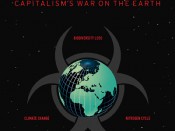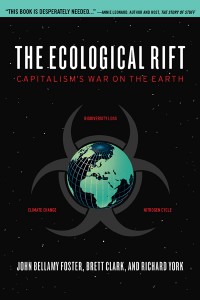In this time of growing ecological and economic crisis, John Bellamy Foster’s voice stands out like no other. In his new book, The Ecological Revolution, he demonstrates that questions of ecology cannot be separated from questions of economics, and that building a truly sustainable future means putting people and the planet before profit.
—Howard Zinn, author of A People’s History of the United States
Foster is the most systematic thinker on red-green politics writing today—and he is quite clear about What is to be done! In these essays, he applies Marx’s theory of metabolic rift to elucidate a variety of contexts—the Pentagon’s pursuit of oil, neoliberalism and the Jo’burg Manifesto, the poverty of contemporary sociology, imperialism and ecological debt, critique of the New Sustainability Paradigm—all the while keeping his synthesis of historical scholarship, natural scientific detail, and Marxist theory readily accessible to a wide readership. Here is reason and discipline driven by passion and care.
—Ariel Salleh, Research Associate in Political Economy, at the University of Sydney
Author of Ecofeminism as Politics, Editor of Eco-Sufficiency and Global Justice, and Co-editor of the journal Capitalism Nature Socialism
In The Ecological Revolution, John Bellamy Foster rightly shows the inadequacy of the technological approaches to which the capitalist response to the ecological crisis is limited, raising the question of a wider revolution in ecology and community. In the process he puts to rest the widely held assumption that Marx and Marxists have little to contribute on the ecological crisis. His book demonstrates that Marx addressed the ecological issues with keen insight and that the historical materialist ecological tradition is alive and relevant today.
—John B. Cobb, Jr., Professor Emeritus, Claremont School of Theology
Co-author with Herman Daly of For the Common Good: Redirecting the Economy Toward Community, The Environment, and a Sustainable Future
For fifteen years, in the books The Vulnerable Planet, Marx’s Ecology, and Ecology Against Capitalism, Foster has warned us of capitalist ecological catastrophe. With accessibility, grace, and a powerful intellectual punch, this new collection tackles the neoconservative petro-military complex of the Bush years sandwiched between Clinton-Gore-Obama’s pernicious eco-neoliberalism. Foster’s searing denunciations of environmental commodification give us confidence to fight bourgeois economic ideology—from the likes of Thomas Friedman, William Nordhaus, Larry Summers, and Nick Stern—and to demand an eco-socialist future.
—Patrick Bond, senior professor of development studies
University of KwaZulu-Natal, Durban
This book is a major achievement. It combines enormous breadth of scholarship with consummate theoretical integration to produce a powerful political argument. It should be required reading for anyone who cares about the future of humanity and the planet – that is, everyone!
—Ted Benton, Marx and Philosophy Review of Books





